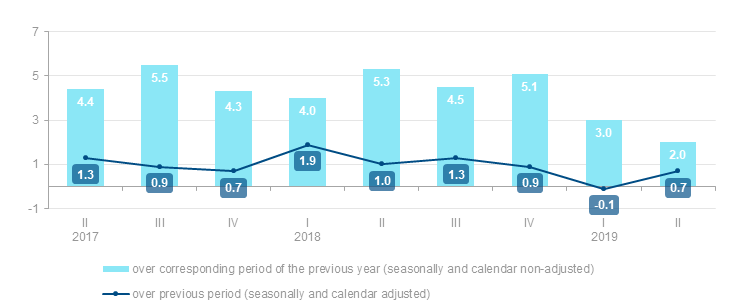
As compared to the previous quarter, GDP value (seasonally and calendar adjusted data) rose by 0.7 %.
Production approach
In the 2nd quarter of 2019, according to provisional data, there was a significant increase in agriculture sector – of 24.5 %, but in forestry and logging sector – of 5.8 %.
The manufacturing sector grew by 0.4 %. Out of the largest manufacturing sectors output increase was registered only in manufacture of fabricated metal products, except machinery and equipment – by 11.7 %. Rise of 4.1 % in printing sector, of 16.6 % – in repair and installation of machinery and equipment, of 25.6 % – in manufacture of electrical equipment had positive impact on the development of the sector. But reduction was observed in manufacture of food products (of 1.1 %), manufacture of wood and of products of wood (of 3.2 %) and manufacture of other non-metallic mineral products (of 7.7 %).
Construction production volume rose by 1.0 %. Volume of construction of buildings grew by 4.6 %, volume of civil engineering – reduced by 3.8 % (of which, increase of 16.1 % was observed in construction of roads and railways, but fall of 32.4 % – in construction of utility projects). Specialised construction activities are carried out at the level of the previous year.
Retail trade increased by 2.5 %, of which trade in food products – by 2.7 %, but trade in non-food products (including sale of automotive fuel at gas stations) – by 2.4 %. Wholesale trade, retail trade and repair of motor vehicles and motorcycles rose by 5.5 %, but wholesale – by 4.7 %.
In transport and storage sector decrease of 3.7 % was promoted by drop in freight transport by 4.9 %, rise in passenger traffic by 4.3 %, fall in warehousing and support activities for transportation by 7.1 % and increase in postal and courier activities by 19.3 %.
Volume of accommodation and catering services grew by 8.6 %, of which accommodation – of 3.5 %, but catering – increased by 11.0 %.
Information and communication services grew by 2.0 %, including rise of 11.0 % in computer programming and consulting, but telecommunication services and information services experienced drop, respectively – of 3.3 % and 7.0 %.
In financial and insurance activities fall of 7.6 % was ensured by decrease of 13.8 % of value added of monetary financial institutions, which was affected by reduction of profit of financial instruments trading and decrease of commission income (mainly, in non-resident sector). Insurance, reinsurance and pension funding sector and other financial activities sectors had positive impact on the development (rise, respectively, of 15.6 % and 12.2 %).
Volume of professional, scientific and technical activities rose by 9.7 %, of which architectural, engineering, technical testing and analysis services – by 10.9 %, activities of head offices; management consultancy activities – by 19.8 %, while drop of 9.2 % was observed in scientific and technical activities.
In the 2nd quarter of 2019 the volume of taxes on products (value added tax, excise and customs taxes) decreased by 3.2 %.
Expenditure approach
As household income continued to increase, in the 2nd quarter of 2019 household expenses for final consumption, compared to the corresponding quarter of the previous year, rose by 3.6 %. Household expenditure on food products rose by 3.1 %, on transport (public transport, purchase and exploitation of transport vehicles) – by 1.2 %, expenditure on recreation and culture – by 4.4 %. Household expenditure on dwelling, which is made up by expenditure on rentals for housing, expenditure on maintenance and repair of the dwelling, water supply, electricity, gas and other fuels, rose by 3.2 %. These groups of expenditure made up 62 % of total household expenditure.
Government final consumption expenditure grew by 2.3 %.
Investment in gross fixed capital rose by 4.3 %. Investment in dwellings, other buildings and structures grew by 1.0 %. Investment in machinery and equipment (of which in transport vehicles) increased by 6.4 % and in intellectual property products (research, computer software, databases, copyrights, etc.) – by 12.9 %.
In the 2nd quarter, exports of goods and services rose by 1.9 %, of which exports of goods (69 % of total exports) by 0.6 % and exports of services by 4.9 %.
Imports of goods and services grew by 7.0 %. Imports of goods, which comprises 83 % of total imports, has risen by 6.9 %, but imports of services – by 7.3 %.
Income approach
Compared to the 2nd quarter of 2018, in the 2nd quarter of 2019 compensation of employees at current prices grew by 9.0 %, of which total wages and salaries – by 9.0 % and employers' social security contributions – by 9.4 %. The sharpest increase in compensation of employees was registered in construction – by 14.5 %, information and communication services – by 12.0 %, but in commercial services sector – by 10.6 %.
Gross operating surplus and mixed income increased by 1.4 %, whereas the balance of taxes on production and imports and subsidies fell by 0.8 %.
GDP changes in the Baltic countries
(at constant prices, seasonally and calendar non-adjusted, as % of the corresponding period of the previous year)

GDP data revision is coming up due to adjustment of GDP time series (starting with data on 1995). Simultaneously, change of reference year will be carried out; hereafter GDP data at constant prices will be published at prices of 2015. The updated information will be available in the CSB databases on 30 September.































